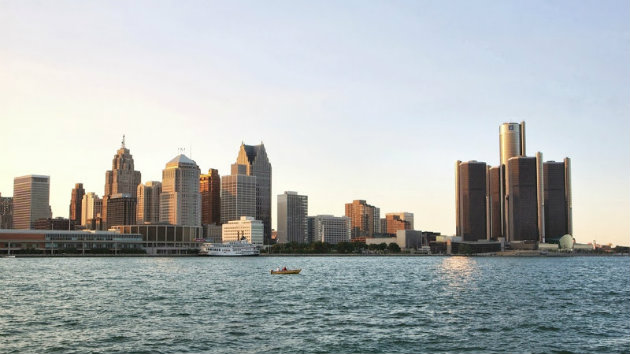Detroit Mayor: ‘We Will Come Back’ From Bankruptcy
Published at
 Cornelia Schaible/Getty Images(DETROIT) — In an exclusive interview on ABC’s This Week, Detroit Mayor Dave Bing said he hopes the city’s decision to file for bankruptcy will provide a new beginning for Motor City.
Cornelia Schaible/Getty Images(DETROIT) — In an exclusive interview on ABC’s This Week, Detroit Mayor Dave Bing said he hopes the city’s decision to file for bankruptcy will provide a new beginning for Motor City.
“I’m surely hoping that this will be a new start. Detroiters are a very, very resilient people,” Bing said. “Detroit is a very iconic city, worldwide, and our people will fight through this. And we will come back.”
The city of Detroit made history on Thursday when it became the largest U.S. city to file for bankruptcy. Detroit’s emergency financial manager Kevyn Orr filed for Chapter 9 protection, citing the city’s $18 billion in debts to over 100,000 creditors.
Bing, a former NBA basketball player, told ABC News’ George Stephanopoulos he is unsure what role the federal government will play in Detroit’s comeback.
“Well, I think it’s very difficult right now to ask directly for support,” Bing said. “I have gotten great support from this administration. I’ve got great support from a lot of the different departments within the administration. They have been helpful, but now that we’ve done our bankruptcy filing, I think we’ve got to take a step back and see what’s next.”
“There’s a lot of conversation, a lot of planning, a lot of negotiations that will go into fixing our city,” he added.
On Friday, a judge ruled the bankruptcy filing unconstitutional, saying it threatens the pension benefits of retirees. Michigan Attorney General Bill Schuette plans to appeal that ruling on behalf of the Gov. Rick Snyder’s office.
Sunday morning, Bing told Stephanopoulos that lawyers shouldn’t “dictate what’s going to happen” next in Detroit.
“Well, I’m not a lawyer. And I’m glad I’m not at this point in time. But I’m hearing — I am hearing that, you know, that the federal constitution will trump the state constitution,” he said. “But whatever happens, we can’t allow lawyers to dictate what’s going to happen in our city and its comeback. We’ve got to throw away a lot of the bickering and fighting amongst us and do what’s best to bring cities like Detroit back.”
The mayor told Stephanopoulos that Detroit’s problems set a precedent for other cities across America.
“There are over 100 major urban cities that are having the same problems that we’re having,” Bing said. “We may be one of the first, we are the largest, but we absolutely will not be the last. And so we’ve got to set a benchmark in terms how to fix our cities and come back from this tragedy.”
Bing also discussed what the city’s money woes mean for the Motor City’s future and sent a message to Detroiters that “the cavalry is coming.”
“We’ve got to make sure that those people understand that we care about them. That we’re going to reinvest in our neighborhoods and give them the things that they need,” Bing said.
“I think our city is going to come back. It’s not going to happen overnight. And we’ve got to be very strategic in whatever we do that we can’t fix it all overnight. People need to understand that,” Bing cautioned. “We’ve got to better communicate that to people and let them know that the cavalry is coming.”
In the past 50 years, Detroit’s racial landscape has gone from approximately 80% white residents to 80% African-American. When asked to respond to what Washington Post reporter Keith Richburg wrote – which read in part “Older Detroiters are correct that the city was surrounded by a ring of often-hostile white suburbs, in a largely conservative state that had little time for a poor, destitute, Democratic and black city… The governor’s appointment of an emergency financial manager… is again seen as a hostile, racist takeover by the state over the city’s elected black leadership” – the mayor said he did not want to make this a “black and white issue”
“It’s a financial issue, and it’s green. We’ve got to get some funding that’s necessary to help us fix our problem right now,” Bing said. “The polarization between our city and our suburbs is something that’s been going on for the last 60 years. We’ve got to change it.”
“Once again, if Detroit fails, doesn’t make it, then all these surrounding suburbs are going to feel the brunt of it also,” he said.
Copyright 2013 ABC News Radio


